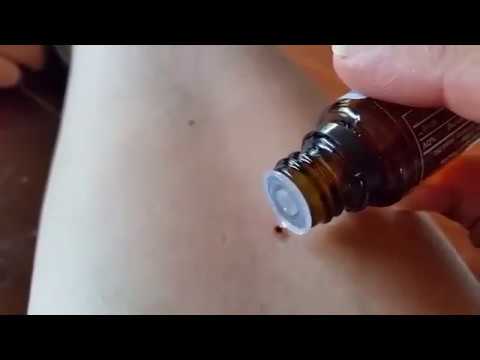We all hate ticks. And getting them off can often cause pain and infection at the bite site. Squeezing with tweezers can shoot infected blood back into your blood stream, possibly causing an infection or passing along the bacterial Lyme Disease or the Powassan* virus, or any of this long list of illnesses.
Red Cross recommendations would have you scraping them away with a credit card, or squeezing the with tweezers. Both methods risk squirting infections back into your blood stream Which is why I prefer this method. Just watch this tick withdraw and scuttle away when it encounters a drop of peppermint oil. (No oil? A hot match should do it.)
Essential Oil not the peppermint extract you can use for cooking. Peppermint oil is made of pure peppermint, while peppermint extract is basically a chemical solution. You can use the oil for cooking, just in smaller amounts.
Peppermint oil has a few other properties. It’s a natural painkiller, and with anti-inflammatory and anti-spasmodic properties. Which means it’s good to rub on aches and pains.
It’s also good for digestive issues (think peppermint tea, or water with a couple of drops of peppermint oil.) Cavities, facial blemishes, stress, colds – you name it, there are lots of uses for peppermint oil.
-
Powassan
Powassan (POW) virus is transmitted to humans by infected ticks. Approximately 75 cases of POW virus disease were reported in the United States over the past 10 years. Most cases have occurred in the Northeast and Great Lakes region. Signs and symptoms of infection can include fever, headache, vomiting, weakness, confusion, seizures, and memory loss. Long-term neurologic problems may occur. There is no specific treatment, but people with severe POW virus illnesses often need to be hospitalized to receive respiratory support, intravenous fluids, or medications to reduce swelling in the brain.
You can reduce your risk of being infected with POW virus by using tick repellents, wearing long sleeves and pants, avoiding bushy and wooded areas, and doing thorough tick checks after spending time outdoors. If you think you or a family member may have POW virus disease, it is important to consult your healthcare provider.
Symptoms
- Many people who become infected with Powassan (POW) virus do not develop any symptoms.
- The incubation period (time from tick bite to onset of illness) ranges from about 1 week to 1 month.
- POW virus can infect the central nervous system and cause encephalitis (inflammation of the brain) and meningitis (inflammation of the membranes that surround the brain and spinal cord).
- Symptoms can include fever, headache, vomiting, weakness, confusion, loss of coordination, speech difficulties, and seizures.
- Approximately half of survivors have permanent neurological symptoms, such as recurrent headaches, muscle wasting and memory problems.
- Approximately 10% of POW virus encephalitis cases are fatal.
Treatment
- There are no vaccines or medications to treat or prevent POW virus infection.
- If you think you or a family member may have POW virus disease, see your health care provider for evaluation and diagnosis.
- Persons with severe POW illnesses often need to be hospitalized. Treatment may include respiratory support, intravenous fluids, and medications to reduce swelling in the brain.
I reckon this would also work with Tea Tree oil which would have the added advantage of soothing the area.
